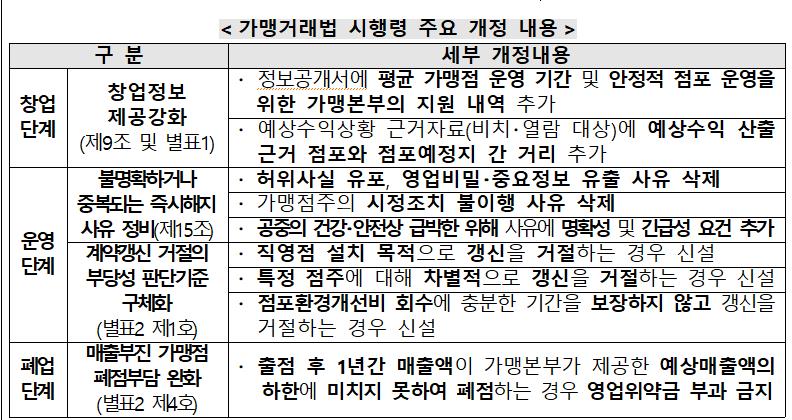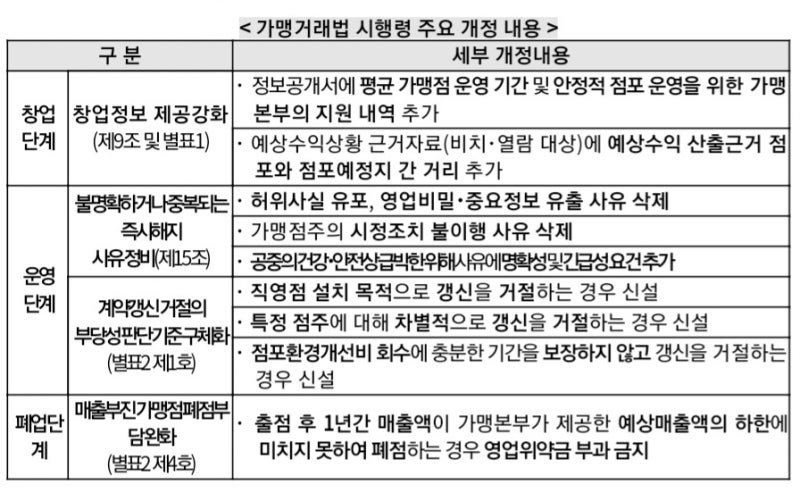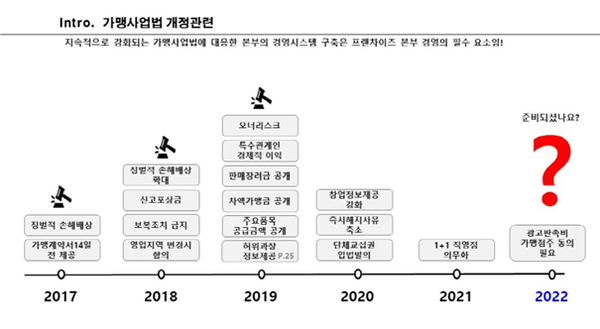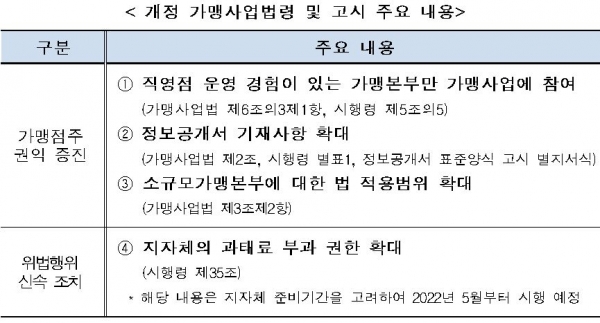Enforcement Decree of the revised franchise business law, must be checked by franchisees!

Enforcement Decree of the revised franchise business law, must be checked by franchisees!

Enforcement Decree of the revised franchise business law, must be checked by franchisees!

As the amendment to the Enforcement Decree of the Member Business Act was approved at the Cabinet meeting on April 21, 2020, the franchise headquarters will not be able to impose penalties for mid-term termination if merchants who fall far short of their expected sales wish to close. In addition, we will look into the membership fees and damages that may occur if terminated in the middle. 1. What is a member business?

The franchise business is often called a franchise, but the domestic franchise industry has a market size of 67.2 trillion won and 806,000 workers.

The franchise industry grows more than 3 trillion won a year despite unfavorable factors such as prolonged economic recession and rising labor costs and rents, providing job creation and start-up opportunities. However, disputes between franchise headquarters and franchises are also steadily occurring, especially in many cases of disputes over the closure of franchises. The enforcement ordinance of the franchise business law revised on April 21, 2020 contains a lot of protecting franchisees, so franchisees should check it out and get help from lawyers for accurate interpretation and application. 2. What is the content of the revised Enforcement Decree of the Member Business Act?

Sales for one year after opening a franchise were lower than expected by the franchise headquarters, and the act of imposing an “operating penalty” was prohibited if a franchise is closed halfway.

The regulations seem to have reflected the fact that the franchise headquarters was also responsible if sales were sluggish even if there was no reason to blame the franchise owner. If you look at the major amendments including this, they are as follows.1. At the start-up stage, the provision of start-up information has been strengthened (Article 9 of the Enforcement Decree and attached Table 1).The average merchant operation period and franchise headquarters support for stable store operation have been added to the information disclosure, and the distance between the store and the store’s scheduled location has been added to the expected profit status data (supplied and viewed).2. In the operational stage, unknown or overlapping reasons for immediate termination were developed (Article 15), and the criteria for judging unfairness of refusal to renew a contract became concrete (Appended Table 2, item 1).Regarding the reasons for immediate termination, the spread of false information, the reason for leakage of trade secrets and important information, and the reason for failure to take corrective action by franchisees have been deleted, adding clarity and urgency requirements. The unfairness criteria for refusing to renew a contract have been newly established as unfairness criteria for refusing to renew for the purpose of establishing a direct store, discriminatory refusal to renew a specific store owner, or failure to guarantee sufficient time to recover store environmental improvement costs.3. At the closing stage, the burden of closing member stores with sluggish sales has been eased (attached Table 2, item 4).If sales do not reach the lower limit of expected sales provided by the franchise headquarters for one year after opening the store, the imposition of operating penalties has been prohibited.As mentioned above, the business environment of franchisees is expected to improve in the future as a revision to the franchise business law comes out. However, even if the franchise business law and the enforcement ordinance are revised in favor of franchisees, it is necessary to appoint a lawyer to deal with disputes because there is still a “power difference” from the franchise headquarters. 3. Know-how of law firm Lian Partners onlyAs mentioned above, the business environment of franchisees is expected to improve in the future as a revision to the franchise business law comes out. However, even if the franchise business law and the enforcement ordinance are revised in favor of franchisees, it is necessary to appoint a lawyer to deal with disputes because there is still a “power difference” from the franchise headquarters. 3. Know-how of law firm Lian Partners onlyLEE & Partners, a law firm, provides customized legal services through experience in large law firms and real estate consultation leepts.comLEE & Partners, a law firm, provides customized legal services through experience in large law firms and real estate consultation leepts.comLEE & Partners, a law firm, provides customized legal services through experience in large law firms and real estate consultation leepts.comIn the case of franchise disputes, it is often difficult to proceed due to the difference in power between the franchise headquarters and franchises. Therefore, it is necessary to proceed with the case with the help of a lawyer who has a large number of experience in the field. In the event of a dispute with the franchise headquarters, please join Lian Partners, a law firm that can lead to successful results by providing the best solution. Law firm Lian Partners Seoul OfficeLaw firm Lian Partners Germany (Frankfurt) Office, Seocho Clover Tower 1302, 347 Seocho-daero, Seocho-gu, SeoulFrankfurt Office (Germany) Ventura Tower 12F, Mergenthallee 10-12, 65760 Eschborn, Germany Tel: +496196 400 139 | Fax: +496196 400 910 | Mobile: +49 172 573 3497Frankfurt Office (Germany) Ventura Tower 12F, Mergenthallee 10-12, 65760 Eschborn, Germany Tel: +496196 400 139 | Fax: +496196 400 910 | Mobile: +49 172 573 3497Frankfurt Office (Germany) Ventura Tower 12F, Mergenthallee 10-12, 65760 Eschborn, Germany Tel: +496196 400 139 | Fax: +496196 400 910 | Mobile: +49 172 573 3497